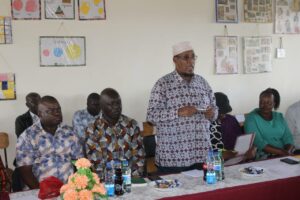
The National Assembly Committee on Cohesion and Equal Opportunities is rooting for syllabuses and textbooks tailored for learners with special needs.
Led by chairman Yussuf Haji, members of the committee said academic programmes in special schools across the country are disjointed due to a lack of a syllabus and textbooks to guide teachers and learners.
“The committee’s fact-finding visits to special schools have established that the Education Ministry did not factor in the preparation of the syllabus and the supply of textbooks suited for children with special needs,” said Haji.
Haji said the Committee will recommend that when developing a curriculum for students with disabilities, key considerations should be individualizing learning plans tailored to each learner’s needs.
This, he said, will foster a supportive and inclusive learning environment, and provide accessible instructional materials and technologies, among others.
One team of the Committee toured Wire, Nyairicha, St Catherine, Malaba, and Mukhonje Special schools in Nyanza and Western regions, while another group conducted a similar tour in Nyeri and Nakuru counties.
Members of the Committee came face-to-face with a myriad of challenges facing the institutions, frustrating efforts to ensure learners access quality education.
“The challenges we encountered range from the deplorable state of infrastructure, lack of learning equipment and teaching guides, an acute shortage of teachers, and a lack of food,” said Haji.
He added: “Some school administrators told the committee that learners were starving and they had to borrow food from well-wishers to feed them.”
Kamkunji MP Yussuf Hassan said they will push the government to be sensitive to children with special needs seeking education.
“I am living with disability and so I have a better understanding of the needs of such people. Learners with special needs have a right to access quality education just like any other child,” he added.
Kasipul MP Charles Were said the Education Ministry should include promotion structures for teachers in special schools in the schemes of services to enable them to climb the professional ladder.
“Teachers shy away from special schools because there is no structured way of promoting them,” he noted.
The chairman noted that the committee has developed legislation that, if passed, will compel the government to pay caregivers of learners in special schools.
This is after the Committee established that in some schools, such caretakers had to quit due to non-payment of their dues.
Shinyalu MP Fredrick Ikana said there is a need for the government to double the capitation paid for each learner with special needs.
“The requirements for learners with special needs are many, and therefore it is illogical for them to be allocated the same amount of capital as normal students,” said Ikana.
The Committee called on the government to put all learners in special schools on medical cover.